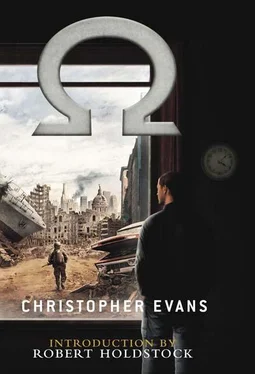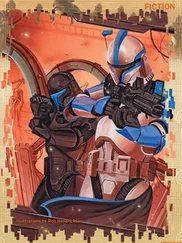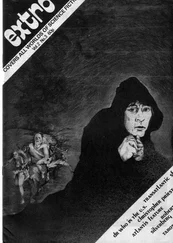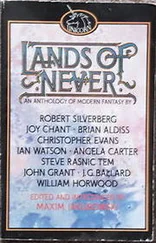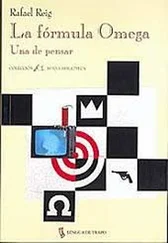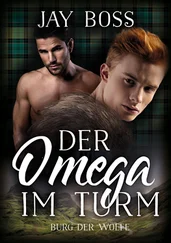Nothing. Just the dull resonance of metal on metal.
The pistol wasn’t armed. How stupid of me to think they’d assume my conversion to their cause.
I opened my eyes. For an instant I was certain I had soiled myself, but somehow I had imagined to avoid this indignity. My hands were quivering as I pulled the pistol from my mouth and let it fall to the floor.
“I think,” Legister said with a measured air of exasperation, “the situation demands more than futile theatrics.”
There was the sound of gunfire. It came from outside, in the main corridor.
Legister and Rhys had to climb over the mound of parachute bundles in the aisle to get into the cabin. Marisa was holding a pistol, but she went into a quivering paroxysm of fear that made me embrace her protectively from behind. Immediately she began to struggle, forcing me to grab her hand to prevent her from turning the gun on me.
The plane lurched into a steeper dive. I managed to keep us upright, still restraining Marisa with one arm around her waist while the other tussled for possession of her firearm. It felt like we were engaged in some bizarre military dance.
Behind me Giselle was talking to a flight controller on the ground, demanding clearance for an emergency landing.
Legister, Rhys and the two MPs had arranged themselves around the cabin, huddling behind nepenthe victims, their weapons aimed at the door. The engine pitch began dropping while the voice traffic from the ground grew more fierce and urgent. There was a stunning bang that sent me reeling.
I landed with Marisa on top of me. She lay limp, her hair in my face. I tried to push her up, but she rolled off me. I heard automatic fire, this time inside the cabin. Marisa’s eyes were closed, her neck slick and hot in my hand. It was blood.
There was a gash on the right side of her neck, shrapnel embedded there. It had severed the carotid artery, which was still weakly pulsing blood.
The air stank of scorched hair and plastic explosive. I tried to shake Marisa awake, but her eyes rolled under her lids and her body sagged. She was gone.
“We’re on target,” Giselle shouted breathlessly at me over the urgent radio noise from the ground. “Almost there. You must hold them!”
I recovered Marisa’s pistol and, because I knew there was nothing for it, hauled her upright, wedging her in the doorway, piling the parachute packs around her into a makeshift wall.
Several of my uncle’s security detachment were already inside the cabin. Some were already heaving dead bodies aside. At first I thought that everyone had been killed, but Rhys was hauled to his feet. Though bloodstained and groggy, he didn’t look seriously injured.
My uncle came through the mangled doorway, also toting a pistol, looking briskly impatient. He motioned to the guards to drag Rhys over and turned towards me.
“Step aside, Owain.”
I was cowering behind Marisa’s corpse and the parachute bundles. Rhys’s head lolled, his eyes barely open. Behind me ground control was sending strident messages but neither Giselle nor the pilot was answering. I didn’t know the pilot; he looked far too young to have been given such an important duty.
“Step aside,” my uncle said again.
He was keeping his distance but looked consumed with a violent urgency. It felt despicable to be hiding behind the corpse of an innocent woman whom Owain had misused; but there was nothing else I could do.
“I don’t believe you’re any part of this, my boy. We need to end it now.”
I didn’t say anything. My uncle pressed the barrel of his pistol against Rhys’s temple.
“It’s in your hands.”
Bizarrely, in that moment everything slid to a halt, all movement and noise dwindling, no more hectic darting and jostling, no more gunfire or engine roar or relentless radio squawk. Even the smell of cordite was gone, along with the sense of defilement of my bloodied hands and the frantic thumping of my heart. Stillness and silence descended for what must have been the merest of instants, yet it was enough to absorb the implacable determination in my uncle’s face. He would have his way no matter what.
“En plein dans le mille!” Giselle said behind me.
I heard the shot, glimpsed Rhys’s head recoil, even as I thrust my gun-hand out and fired two, three, four shots at my uncle’s head.
The parachute packs began collapsing on top of me. There was more gunfire, and I thought I’d been hit, but no pain came. The flight deck door was slammed shut, bolted.
Giselle was holding a compact revolver. She let it drop as I scrambled to my feet. A burgundy stain was spreading under her left collarbone.
Gently I drew her to me. The pilot was looking around. He couldn’t have been more than sixteen or seventeen.
“Maman?” he said.
She shook her head at him, gently but without comfort. Her gaze went to the window.
“Say goodbye, Owain,” she said softly in English.
Directly below us a seething ball of fire was billowing up from the ground. In the seconds before it consumed us I was already in mental flight back to Broadoaks. The green Scenic was standing in the car park near to Tanya’s Yaris. I heard Tanya say: “Are we going to let them see him?” The tall woman with the five children appeared. I experienced a jolt of recognition even as the two youngest girls broke from the others and began running towards us, shouting: “Mum! Dad!”
The hardest task for the historian, my father liked to assert, is to consider the evidence without prejudice. We all have prior agendas and tend to find what we’re looking for while ignoring anything contrary to our expectations. So history, because it is a human pursuit, is always partial and prejudiced no less than our own interior lives: both are just a sum of contingent memories.
“You still with me?” Tanya asked.
“My father,” I said. “I was remembering something he used to say.”
“Oh?”
“Words. For him everything in the end had to be reduced to them.”
“Well,” she said on reflection, “it was his trade.”
“His life. He could always express things pithily but he found it harder to act. To do the ordinary things that make us human.”
She was sitting in the passenger seat of the Yaris while I drove; or rather while we waited at a red light.
“I’d say his illness was having the opposite effect.”
I understood what she meant. The last couple of times we had visited him he was more emotional, prone to fits of laughter or bouts of tears. He would grin or shake his head if either of us addressed him with a question he considered too problematical. He still erratically recognised both of us, though sometimes he would talk as if we were his siblings or friends from his youth. All this was normal, Dr Pearce had assured us, a typical pattern of decline.
“I think he may actually be happier,” Tanya said.
“You might be right,” I admitted. “He’s lost his suit of mental armour. It’s made him lighter on his feet.”
The lights changed and we drove on. We were returning from a lunch in Kingston to celebrate Geoff’s eldest children’s birthdays. They fell within a week of one another, and it was an opportunity to get together. We had made it an afternoon gathering in a child-friendly restaurant close to where Geoff lived. His wife, Candida, was a solicitor. They had known one another since childhood and had married the year after Tanya and I wed. Three children, all under seven: James, Charlotte, and Robin. We were godparents to Charlie, as she liked to be called, and frequent visitors to one another’s houses. Geoff had always remained one of our closest friends. They had both been immensely supportive in the difficult aftermath of my accident. For a while everyone was worried that I might have suffered some permanent form of brain damage.
Читать дальше
